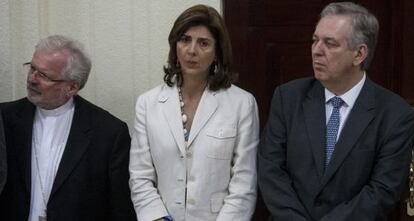Tiny advances after the third day of talks between government and opposition
Supreme Court rules all demonstrations must obtain explicit and prior permission from authorities

The dialogue between the government and opposition leaders in Venezuela is running out of breath after a few months. This Tuesday the parties held the third session of talks in the presence of witnesses, including the foreign secretaries of Brazil and Colombia as well as the Nuncio. The location of the meeting gave away who stood to lose given that the event took place in the evening at the office of the Vice President of the Republic in downtown Caracas. Just in case the snub was not enough, this time President Nicolás Maduro did not even attend.
Beyond the symbols, the credibility of the talks rests on the results it produces and how long they take to come about. Ramón Guillermo Aveledo, Executive Secretary of the opposition-led Mesa de la Unidad Democrática (MUD) or Democratic Unity Roundtable and one of the participants of the meeting said upon leaving that he was conscious of the urgent need to reach some agreements in order to legitimize the forum in time, given that few Venezuelans have faith in it. “In today’s meeting we have agreed that we must reach results,” he said, trying to make the process gain traction when, perhaps, this may be the last opportunity for a political path to peace in Venezuela. “The dialogues, which are legitimate democratic means between people who have divergent opinions, are useful as long as they produce results.”
Aveledo and Venezuelan Vice President Jorge Arreaza, who served as spokespeople for the two sides after the meeting, however, could not show even meager results. The parties agreed to create peer working groups that will come together on Friday to discuss the creation of a Truth Commission to investigate the violent acts that took place over the last few months. They will also be charged with studying a possible vote on an amnesty law to benefit political prisoners. The representatives of the opposition call for their freedom while the government plays word games, saying that in Venezuela there are no “presos políticos” or political prisoners. There are “políticos presos” or imprisoned politicians who have not been charged for their beliefs.
Another agreement that came out of Thursday’s meeting highlights the level of distrust and political polarization in Venezuela. Both parties agreed to create a medical commission to confirm the health status of Commissioner Iván Simonovis who has been in prison for almost 10 years. Simonovis was the highest authority of the Metropolitan Police of Caracas when he had to oversee the handling of the 2002 riots that led to 19 deaths near the Miraflores Presidential Palace. Later that year, a military coup sidestepped Hugo Chávez for 47 hours. The Venezuelan judiciary charged Simonovis and some police officers for the attempt. At the end of a long and rough trial, the commissioner was sentenced to 30 years in prison, the maximum penalty in Venezuela.
In today’s meeting we, both parties, have agreed that we must produce results,”
Ramón Guillermo Aveledo
The deterioration of his health and the belief that he served as a scapegoat when the government wanted to settle scores for the events of April 2002 turned him into a cause célèbre for the opposition. Now government representatives and the MUD have agreed to create a commission to verify his living conditions in prison. Each party will choose one doctor and a third “neutral” expert.
Even if these announcements could satisfy the high expectations the talks generate, there is the risk that the agreements will not be implemented. For example, the state media and propaganda apparatus gave extensive coverage to the statements that the representatives of the Chavista associations of victims of April 2002 gave at the end of the meeting. These groups participated in the dialogue with the consent of the opposition per government request - a government that will persist in imposing its own version of the events.
The spokespeople of these victims’ groups staunchly stood against freeing Simonovis and passing the amnesty law. “We are not God and we cannot grant forgiveness,” said Edgar Tortosa on behalf of the Association of Victims of the Coup d’État of April 11, 2002. “We don’t believe in any amnesty law and we have told everyone.”
At a previous event, President Nicolás Maduro said, “the opposition wants to free, who knows by what means, the man who led the slaughter of April 11, 2002.”
While those at the negotiation table list some slight progress and the government fights to make time to squash the protests, the situation on the streets is sending inauspicious signals to the peace process.
Translation: Dyane Jean François
Tu suscripción se está usando en otro dispositivo
¿Quieres añadir otro usuario a tu suscripción?
Si continúas leyendo en este dispositivo, no se podrá leer en el otro.
FlechaTu suscripción se está usando en otro dispositivo y solo puedes acceder a EL PAÍS desde un dispositivo a la vez.
Si quieres compartir tu cuenta, cambia tu suscripción a la modalidad Premium, así podrás añadir otro usuario. Cada uno accederá con su propia cuenta de email, lo que os permitirá personalizar vuestra experiencia en EL PAÍS.
¿Tienes una suscripción de empresa? Accede aquí para contratar más cuentas.
En el caso de no saber quién está usando tu cuenta, te recomendamos cambiar tu contraseña aquí.
Si decides continuar compartiendo tu cuenta, este mensaje se mostrará en tu dispositivo y en el de la otra persona que está usando tu cuenta de forma indefinida, afectando a tu experiencia de lectura. Puedes consultar aquí los términos y condiciones de la suscripción digital.








































